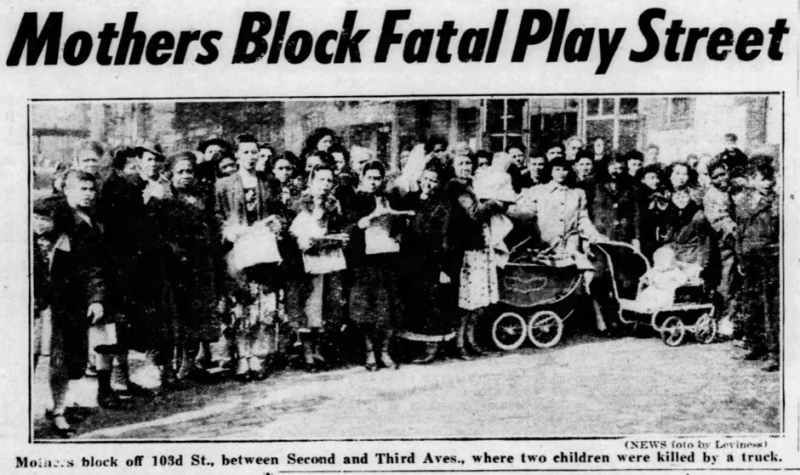Save the Date: Baby Carriage Blockade is Back on Jan. 11


Call it Mothers Against Deadly Driving.
Transportation Alternatives is asking parents of young children to push their strollers to City Hall on Jan. 11 for a modern day take on historic marches by mothers seeking to reclaim streets from car drivers and give them back to the people.
The impetus for the rally is two-fold: earlier this month, a reckless driver, who should never have been behind the wheel, fatally struck a 3-year-old. And the City Council is long overdue in passing the so-called Reckless Driver Accountability Act, which would allow authorities to seize the cars of drivers with the worst records of speeding and running red lights.
The moms, dads, kids and anyone else who is sick of the ongoing carnage on city roadways are expected to rally outside City Hall to demand more action from city leaders.
Such stroller demonstrations have a long history in New York City, dating back at least to 1949, when moms blocked traffic with strollers to demand safe streets for their kids after a truck driver killed two 10-year-old girls on what was supposed to be a play street, according to City Lab. The protests were quickly coined a “baby carriage blockade.”
“They’ll have to kill us to get through here,” one of the moms told the Daily News at the time.
A decade later, moms were still going strong, with about a dozen baby-pushing moms barricading the intersection of South Road and 160th Street in Queens in January, 1959, to demand a traffic light. The demonstrations went on for weeks during rush-hour until the city finally gave in and installed the signal, according to City Lab.
TIL about peaceful protests in NYC in the 50s demanding safer street infrastructure. More of this please. pic.twitter.com/KI0V4lD0in
— Chris Whong (@chris_whong) December 13, 2019
The Jan. 11 protest is also inspired by the 1970s Dutch movement known as “Stop the Child-Murder, or in Dutch, “Stop de Kindermoord,” which were massive kid-led protests to reclaim their towns and streets from cars, leading to a decline in traffic fatalities and a cultural shift that turned the Netherlands into one of the most safe places in the world.
The protest will come about a month after 59-year-old Jamie Sabogal — whose license was suspended, partly because he had racked up 20 moving violations plus another arrest for driving without a license — struck 3-year-old Bertin DeJesus as his mother pushed him in a stroller across First Avenue near 116th Street on Dec. 9. DeJesus was the third 3-year-old child and the sixth under the age of 11 fatally struck by dangerous drivers so far this year.
It also comes almost a year and a half since another motorist ran over and killed 4-year-old Luz Gonzalez while on a Bushwick sidewalk in June 2018. It’s too late for Gonzalez and DeJesus; for the 1-year-old girl who was killed by a driver who hopped the curb, striking her on the sidewalk as she, too, sat in her stroller; for 10-year-old Enzo Farachio; for 10-year-old Dalerjon Shahobiddinov; and for all of the other youngsters killed by someone behind the wheel — but it shouldn’t be too late to stop the next kid from being killed by passing the Reckless Driving bill, said Families for Safe Streets member Fabiola Mendieta, who was Gonzalez’s godmother.
Parents stroller rally, 250 Broadway, Jan. 11, noon.





